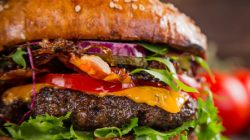The Influence of Label Claims
With so much information being thrown daily at consumers at a rapid-fire pace, it’s any wonder that they have time or the desire to read anything let alone a food label. But read labels they do—at a dizzying rate. Whether it’s looking for confirmation of health or justification for indulgence, consumers have become avid readers of food labels. What labels are consumers seeking and how much do they really want to know?
Natural. Healthy. Organic. Free-from _____. Some of these claims (like the first two) remain undefined while others, such as gluten-free, are easier to quantify. While the industry awaits the FDA’s definition of “natural” which is supposedly coming1, consumers are making purchase decisions based on the information they do have. The FDA continues to study consumer’s purchase decisions related to food label claims and has concluded that almost 90% of adults use claims to make decisions2. And if it has a claim that implies health, the consumer is more likely to purchase the product and less likely to read the nutrition label on the back.3
Top Claims Consumers Care About
So, what claims are consumers responding to the most right now? Looking at the better-for-you (BFY) snack category is a safe bet as this is a category where consumers seek indulgence and health. While there are so many claims vying for their attention, there are two claims that resonate with consumers the most when it comes to snacks: calories and fat.4 Coming up right behind that is sugar and gluten followed by organic and GMO-free. And placement of the claims on BFY snack packages matters. Two- thirds of consumers read front of the package claims while almost half are inspired to read the back.5
Free-from
Meaning exactly what it says, a “free from” claim implies that a product doesn’t contain, for example, gluten. And to consumers, a “free-from” claim implies the product is healthier and less processed than a product without the claim.6 A few more “free-from” facts:
- 84% percent of consumers purchase products with a “free-from” claim because they want “more natural or less processed foods.”7
- Gluten-free foods have grown 36% to $1.6 billion between the years 2010-2015 and are expected to reach $2 billion by 2020.8
- Only 37% of consumers are willing to pay more from a “free-from” product.9
“Feel-Good” Claims Growing
While “free-from” is important, Millennials are responding to claims of the warm, fuzzy kind. While what a product doesn’t have is important, the ingredients it does contain is also important. Ethical sourcing, traceability and animal welfare are practices Millennials respond to because they reflect the brand and its corporate values. Logos indicating certification in groups like MSC (Marine Stewardship Council), SQF (Safe Quality Food) and EFI (Equitable Food Initiative) go a long way towards earning consumer loyalty.
Make Way for A New Term
Ever heard of “transitional organic”? You might start seeing more of it as “natural” and “organic become more regulated and defined. Meaning “moving in the direction of organic,” transitional organic implies a brand is working on being organic which might move some consumers to respect the time and investment it takes to do so.
Mini Case Study / Panera
Panera has led the way in removing anything artificial from its menu and thus allowing it to make free-from claims and more. The company has completed this initiative and continues to clean things up with a recent focus on sugar. Panera designed a new cup educating consumers on the amount of sugar in soft drinks resulting in an 8% redistribution of sales from sugar-laden soft drinks to less sweetened beverages.10 Also, the company has realized a 21% increase in net income and 6% revenue increase in Q1, 2017.11 Panera is clearly (and cleanly!) proving that leading the way in clean claims isn’t a bad thing and if it’s done correctly, can earn consumer trust and loyalty.
Got a few labels need cleaning up? Contact Nikken’s technical specialists who are ready to share how our real food ingredient portfolio can make it easy to makes some clean claims.
Sources
- https://www.foodnavigator-usa.com/Article/2017/10/23/Judge-stays-Annie-s-natural-lawsuit-predicts-FDA-will-address-natural-claims
- Food Label Claims and Their Impact on Consumers / FDA Center for Food Safety and Applied Nutrition Linda Verrill, Ph.D. March 2017 https://www.fda.gov/downloads/Food/NewsEvents/WorkshopsMeetingsConferences/UCM547091.pptx
- Ibid.
- http://www.foodbusinessnews.net/articles/news_home/Consumer_Trends/2017/08/Which_health_claims_are_shoppe.aspx?ID=%7BB4FB25C8-86BA-428A-A0ED-763DFBE7FCEA%7D
- Ibid.
- http://www.foodbusinessnews.net/articles/news_home/Consumer_Trends/2017/04/Trends_driving_the_free-from_p.aspx?ID={FC0A87B9-79A1-4C8F-8614-E89A4E4F7DC4}
- Ibid.
- Ibid.
- Ibid.
- http://www.foodbusinessnews.net/articles/news_home/Food-Service-Retail/2017/08/Panera_Bread_takes_next_step_i.aspx?ID=%7B59817896-51B2-4E4D-947E-740E32A9BA4D%7D


